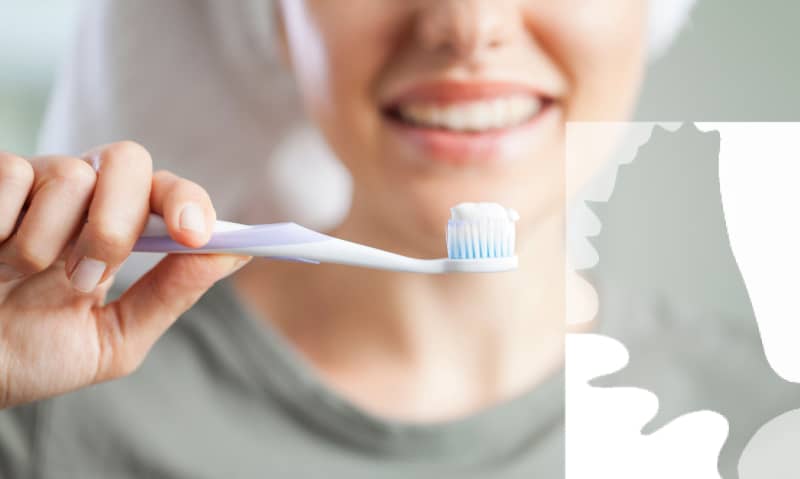How to Take Care of Single, Bridge, and Full Arch Dental Implants

Homecare Tips for Your Dental Implants
Dental implants are an innovative restorative treatment that allows patients to repair the function of their smile after losing one or more teeth. These restorations look and feel like natural teeth, creating aesthetically pleasing results while giving you back the ability to smile and chew confidently.
They are the ideal solution for anyone suffering from missing teeth due to decay, injury, or gum disease. However, dental implant care is essential to keep these medical-grade devices healthy. Learning how to take care of implants will contribute to their longevity and maintain their beautiful appearance.
Caring for a Dental Implant
Dental implant care doesn’t require a rigorous maintenance routine.
Here are some general guidelines for caring for your single implant, implant-supported bridge, or implant-supported dentures. Always make sure to follow your dentist’s instructions on how to clean implants, as well,—every type of implant restoration is different, and each patient has unique needs.
Single Dental Implants
A single dental implant replaces one tooth. The implant crown can’t decay, but the titanium post can become inflamed and develop a periodontal infection called peri-implantitis. This condition is the destructive inflammatory process affecting hard and soft tissues around the dental implant and can lead to the implant becoming loose. However, the failure rate for implants is incredibly low, with peri-implantitis accounting for 2.32% of failed implants.
You can prevent peri-implantitis with proper implant care, which begins with a good oral hygiene routine. This routine will be similar to how you care for your natural teeth. When learning how to clean implants, you’ll want to make sure to:
- Brush for two minutes, twice a day
- Use a soft-bristled toothbrush
- Floss daily
- Avoid abrasive toothpaste
- Limit hard, sticky foods
A water flosser may be helpful for patients who find using traditional dental floss challenging.
Implant-Supported Bridges
Dental implants can replace several teeth by supporting a multi-unit bridge. Like a single implant, plaque and bacteria can accumulate on the bridge implant, weakening the connection with the bone. Brushing and flossing daily around the bridge will eliminate plaque buildup.
Using a traditional brush to reach the tissue underneath the restoration can be challenging. A smaller, interproximal brush is designed specifically for these situations. You can also use Superfloss or a floss threader to clean beneath the bridge.
Regardless of how you maintain your implants, only use plastic tools. Metal causes microscopic scratches on the implant post that can harbor plaque.
Removable Implant-Supported Dentures
Some implant-retained dentures are removable. You can take the denture out of your mouth daily to clean it. Carefully handle the prosthetic teeth as you brush, including the underside near the attachments that connect your dentures and implants. Don’t forget about cleaning your gums, tongue, and around each implant as well.
Once a week, you can soak your denture in a denture-cleaning solution.
Fixed Implant-Supported Dentures
Caring for your fixed denture is as simple as caring for your natural teeth. However, because this denture connects to four, six, or more implants, there are spaces between the artificial arch of the teeth and the natural gum line. An interdental brush is useful in cleaning between these surfaces.
Regular flossing can be done to clean beneath the prosthetic teeth. You’ll need Superfloss or a floss threader to carefully navigate the floss around the teeth. A water flosser is ideal for this type of restoration.
For All Dental Implants
Your dentist may recommend using an electric toothbrush because some are designed specifically for implant care. There are also companies like TePe that create specialized implant care products. Their products are primarily made of plastic to ensure your implant doesn’t sustain damage during your oral hygiene routine.
Once you have a dental implant, some dentists recommend wearing a nightguard. This device prevents you from grinding on your implant while you’re sleeping and saves you from expenses related to replacing your implant.
It’s also important to avoid tobacco products. Smoking reduces the blood flow to the gum tissue, teeth, and bones, putting your dental implant at risk of failing.
Why proper care for your dental implants is essential.
Understanding how to clean implants is important, but knowing what happens when you don’t care for them is also crucial. Dental implants are affected by the same bacteria that destroy your natural teeth.
When not removed, the bacteria turns into a hard deposit surrounding the implant. It cannot be removed by brushing and requires a hygienist to clean around the post. This can lead to receding gums, bone loss, or a failed implant.
Patients who don’t practice good oral hygiene may experience the following symptoms:
- Gum recession
- Difficulty chewing and biting
- Swelling
- Tenderness
- Redness
- Bleeding
These symptoms often indicate an infection, so it’s important to contact your dentist for an appointment if you notice them.
Visit a dentist skilled in dental implants in Wasilla, AK.
Proper dental care is crucial to the success of your dental implants. If you have questions about how to clean implants or are wondering if dental implants could be right for you, reach out to Valley Dental Clinic. Our experienced team provides comprehensive dental care and solutions for the entire family. We take pride in serving our community and getting to know our patients individually. Contact us to learn more or schedule an appointment today.